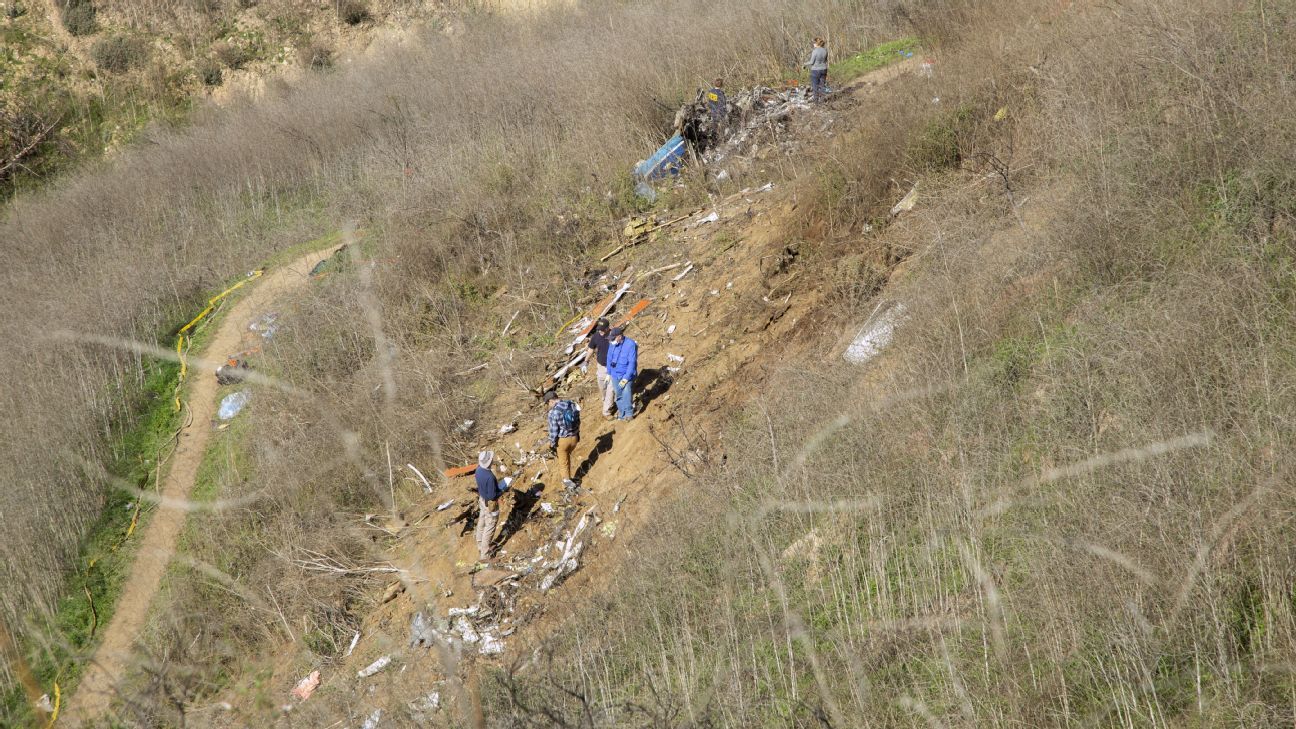It has been a year since Lakers legend Kobe Bryant, his 13-year-old daughter, Gianna, and seven others died in a helicopter crash in the foothills of the Santa Monica Mountains near Calabasas, California. The families were flying to a youth basketball tournament when the pilot encountered thick fog and slammed into a hillside. The Jan. 26, 2020, crash spawned an investigation by the National Transportation Safety Board, as well as a number of civil lawsuits, which remain unresolved or outstanding.
Here are the details of the legal and investigative fallout of the crash, and where those cases stand today:
NTSB investigation
The National Transportation Safety Board announced earlier this month that it scheduled a Feb. 9 board meeting to publicly discuss and determine the probable cause of the crash.
In an initial report about the accident released last February, the NTSB said the pilot, Ara Zobayan, took off shortly after 9 a.m. from John Wayne-Orange County Airport in a Sikorsky S-76B en route to Camarillo, California, about 95 miles north. “Videos and photos taken by the public in the area of the accident … depict fog and low clouds obscuring the hilltops,” the NTSB said in its initial report.
After Zobayan encountered the clouds, he told air traffic control he was climbing to 4,000 feet to find his way out. Instead, he ascended to 2,300 feet and then began a high-speed descent and left turn into the hills. While the helicopter was not equipped with a flight data recorder or cockpit voice recorder, the NTSB estimated that the helicopter hit the hillside at more than 184 mph.
In addition to Bryant and his daughter, Orange Coast College baseball coach John Altobelli, his wife, Keri, and their daughter Alyssa were killed in the crash. Mamba Sports Academy basketball coach Christina Mauser, and mother and daughter Sarah and Payton Chester, and Zobayan also all died in the crash.
Last May, the agency released more than a thousand pages of documents relating to the crash that said there was no evidence of mechanical failure and no indication Zobayan had alcohol or drugs in his system. The report said Zobayan might have “misperceived” the angles at which he was descending and banking.
The NTSB board is likely to determine Zobayan experienced “spatial disorientation” due to poor visibility and that “he wasn’t qualified to fly in [instrument flight rules] conditions,” said Tom Haueter, who spent 30 years working with the NTSB as both a crash investigator and, during his final six years, as the agency’s director of the office of aviation safety.
Instrument flight rules, or IFR, are a set of rules that pilots follow when they have to rely on their instruments to navigate because weather conditions prevent them from having adequate visibility.
“This guy was pushing the edge,” Haueter said. “He shouldn’t have been in the clouds. He shouldn’t have been that close to the clouds … I look at the weather report at the time and think ‘Why the heck did you do this?'”
Zobayan had worked at Island Express, the company that operated the helicopter charter service, for nearly 10 years and had accumulated more than 8,200 hours of flight experience, which included about 1,250 hours in the S-76 helicopter, according to the NTSB.
The NTSB could also make a series of safety recommendations as a result of the crash, Haueter said.
The Sikorsky S-76B, which was built in 1991, was not equipped with a terrain avoidance and warning system, nor was it required to be, Haueter said. Such a system would have alerted Zobayan, even in conditions of low visibility, that he was dangerously close to the ground.
“Terrain warning systems are readily available and fairly cheap nowadays,” Haueter said. “I wouldn’t be surprised if the board indicates that for aircraft involved in these types of charter operations, for them to say ‘You need to have some type of moving map/terrain warning system.'”
Next month’s NTSB board meeting will be webcast to the public and held virtually due to coronavirus restrictions, the agency said this month.
Wrongful death lawsuits
Last February, Bryant’s widow, Vanessa, filed a wrongful death lawsuit against Zobayan’s estate and his employer, Island Express. Bryant filed an amended lawsuit in September naming OC Helicopters, an agency that had arranged trips for years for the Bryant family, as an additional defendant.
Surviving members of the Altobelli, Mauser and Chester families have all since filed similar wrongful death lawsuits against Island Express.
The lawsuits by Vanessa Bryant and the others allege that Island Express and Zobayan were not authorized to fly under instrument flight rules conditions.
“The pilot-in command, Ara George Zobayan was required [to] fly only in conditions that he could navigate visually,” Bryant’s lawsuit states, adding that “witnesses on the ground reported seeing the helicopter flying through a layer of clouds and fog before the helicopter crashed.”
Zobayan also “failed to obtain proper weather data” prior to the flight and “failed to abort the flight when he knew of the cloudy conditions,” the lawsuit states.
Attorneys for Bryant, Island Express Helicopters and Zobayan’s estate did not respond to a request for comment.
Kevin Boyle, an attorney for both the Mauser and Altobelli families, told ESPN the NTSB’s final conclusions about a probable cause for the crash “would not be admissible evidence in the wrongful death lawsuits,” but he added that “factual information from the NTSB is admissible.”
“The jury is supposed to be the one who makes the conclusions at trial,” Boyle said.
The families of those involved in the crash have alleged that OC Helicopters played a role in planning the route the morning of the fatal flight and also failed to abort the flight when it became apparent weather conditions were unsafe.
“While we at OCH continue to grieve for this unimaginable loss, we adamantly deny any responsibility for the accident,” the company said in a statement released in September.
An attorney for OC Helicopters declined to comment last week when contacted by ESPN.
The wrongful death lawsuits were initially filed in California Superior Court in Los Angeles County. However, they’ve since moved to federal court after Island Express sued the air traffic controllers communicating with Zobayan.
Island Express sues air traffic controllers
In August, in response to the wrongful death lawsuits filed by Bryant and other families, Island Express filed what’s known as a cross-complaint, naming air traffic controllers Kyle Larsen and Matthew Conley as cross-defendants. The cross-complaint led to the wrongful death lawsuits being transferred to federal court because Larsen and Conley are federal employees. Island Express alleges the accident “was caused by a series of erroneous acts and/or omissions” by the two men.
Minutes before the crash, Zobayan had switched from communicating with air traffic control at the Burbank airport to his final point of contact during the flight, Larsen, an air traffic controller with Southern California Terminal Radar Approach Control, out of San Diego, according to the filing.
The cross-complaint filed by Island Express alleges that when Larsen last advised Zobayan on his flight path, he improperly denied Zobayan’s request for flight following and incorrectly thought he had terminated radar service with the helicopter.
“Among other things, the accident was caused by Larsen’s failure to properly terminate radar services,” the cross-complaint states, adding, “Zobayan thought he was still receiving radar service at the time of the accident.”
Larsen, who ended his shift just minutes before the crash, also failed to adequately inform Conley, the air traffic controller who’d taken over his shift for him, about the presence of Zobayan’s helicopter, the lawsuit states.
A Department of Justice attorney representing both Larsen and Conley did not respond to a request for comment.
Haueter, the former NTSB investigator, told ESPN that it’s the responsibility of the pilot “to maintain distance from terrain.”
“Air traffic controllers are to separate aircraft. They don’t necessarily separate airplanes from the ground,” he said.
A federal judge has set a hearing for April 8 to rule on a motion to dismiss the cross-complaint against the two air traffic controllers. If that case is dismissed, the wrongful death lawsuits will then be transferred back to state court in Los Angeles County.
Lawsuits over crash site photos
Shortly after the crash, the Los Angeles Times reported that sheriff’s deputies from Los Angeles County had shared photos of the crash site, including graphic pictures of the victims’ remains.
In September, Vanessa Bryant was the first to file a lawsuit against Los Angeles County Sheriff Alex Villanueva and his department over the alleged unauthorized photos, claiming negligence, invasion of privacy, intentional infliction of emotional distress and the violation of her right to privacy under the Fourteenth Amendment. The Chester and Mauser families have since filed similar lawsuits and both added the L.A. County Fire Department as a defendant. The Altobelli family is expected to file a lawsuit “within the next couple of months,” according to Boyle, who represents both the Mauser and Altobelli families.
“Faced with a scene of unimaginable loss, no fewer than eight sheriff’s deputies at the crash site pulled out their personal cell phones and snapped photos of the dead children, parents and coaches. The deputies took these photos for their own personal gratification,” Bryant’s lawsuit states.
“One deputy even used his photos of the victims to try to impress a woman at a bar, bragging about how he had been at the crash site,” the lawsuit states.
Attorneys for both L.A. County and Villanueva did not respond to a request for comment.
Villanueva said in March that when he became aware of the photos, he ordered his deputies to delete the images from their phones. Villanueva said that while the department had a policy against taking and sharing crime scene photos, the policy did not apply to accident scenes.
The legal dispute has already led to change within the state of California. In September, Gov. Gavin Newsom signed legislation making it a misdemeanor, with fines up to $1,000 per offense, for first responders to take photos of deceased people at a crime or accident scene for anything other than official law enforcement purposes.
That law went into effect Jan. 1.
Vanessa Bryant sued by her mother
In December, Sofia Urbieta, Vanessa Bryant’s mother, sued her daughter in Orange County, California. Urbieta alleges she was never paid for being the longtime personal assistant of Vanessa and Kobe Bryant and for serving as the nanny to the couple’s four daughters.
Urbieta claims Kobe Bryant promised to take care of her financially for the rest of her life in exchange for her help raising the children, and that Vanessa did not intend to honor any of that agreement.
The lawsuit states that Urbieta worked a “grueling schedule” while taking care of her grandchildren and “was forced to work over twelve hours per day with no meal or rest breaks.”
Urbieta further alleges she was forced to sell her Newport Coast home, which the Bryants had paid for and held in their names, and that Vanessa Bryant deceived her early last year by selling a car the couple provided her and by forcing her into an apartment.
Attorneys for Urbieta and Vanessa Bryant did not respond to requests for comment.
In December, Bryant denounced her mother’s lawsuit.
“She was a grandmother who was supported by me and her son-in-law at my request,” Bryant said in a statement at the time. “She now wants to back charge me $96 per hour for supposedly working 12 hours a day for 18 years for watching her grandchildren. In reality, she only occasionally babysat my older girls when they were toddlers.”
Financial experts estimate Vanessa Bryant inherited control of an estate worth up to $600 million, the Los Angeles Times reported.
Information from the Associated Press was included in this report.

